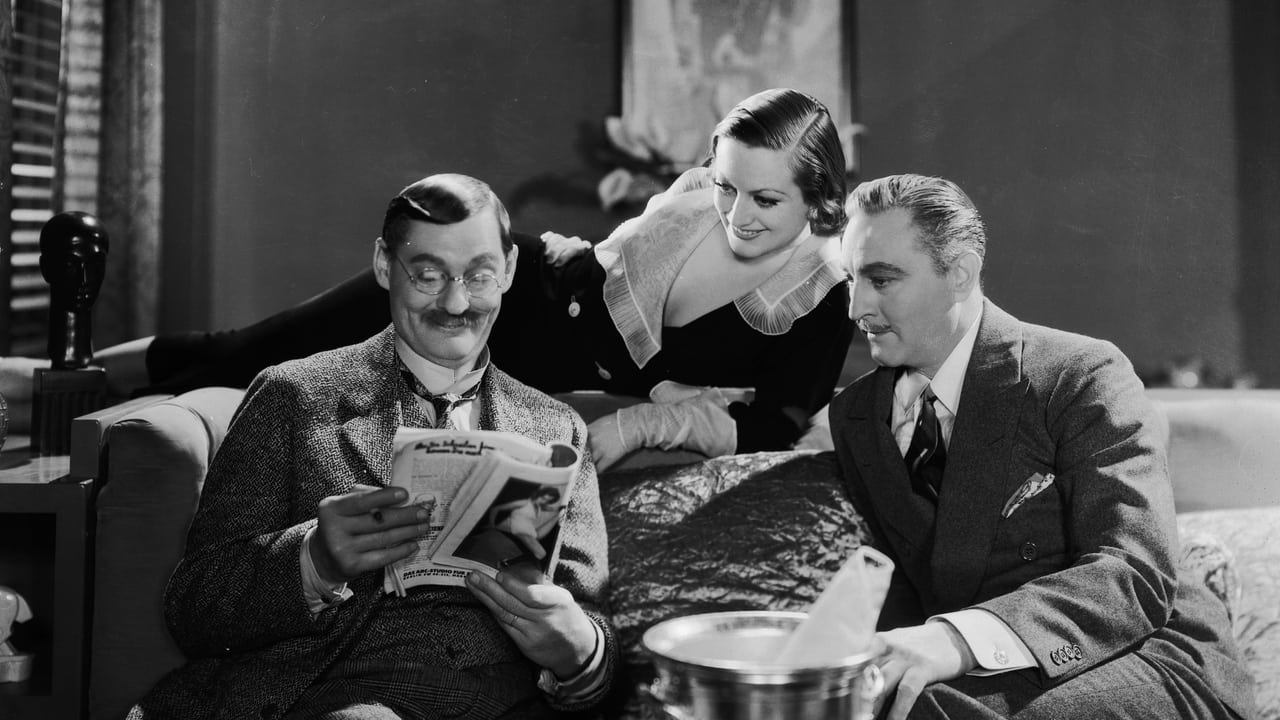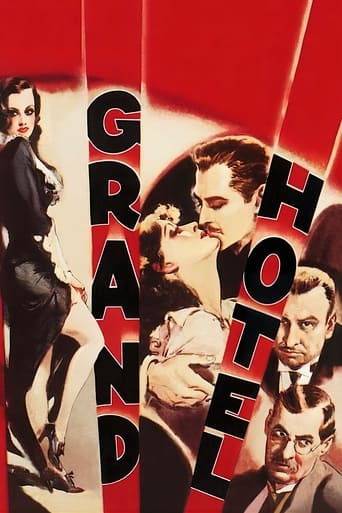

Wow! Such a good movie.
... View MoreGood concept, poorly executed.
... View MoreAbsolutely amazing
... View MoreAmazing worth wacthing. So good. Biased but well made with many good points.
... View MoreCopyright 5 May 1932 by Metro-Goldwyn-Mayer Distributing Corp. A Metro-Goldwyn-Mayer (controlled by Loew's Inc.) picture. New York opening at the Astor, 12 April 1932. U.S. release: September 1932. 12 reels. 10,086 feet. 112 minutes.SYNOPSIS: Grand Hotel, Berlin. "People come, people go. Nothing ever happens" — except murder, robbery, seduction, embezzlement, attempted suicide, high-life 'living" and despair.NOTES: Vicki Baum's rather drably titled "Menschen im Hotel" ("People in a Hotel") became the more colorful "Grand Hotel" when translated to Broadway on 13 November 1930. Eugenie Leontovich, Henry Hull, Hortense Alden, Sig Rumann, Sam Jaffe, Romaine Callender and Walter Vonnegut played the roles essayed on the screen by Garbo, John Barrymore, Crawford, Beery, Lionel Barrymore, Stone and Hersholt respectively. Rafaela Ottiano, alone of the Broadway cast, repeats her role in the film. The film ran 444 performances at The National. It was directed by Herman Shumlin.Although Grand Hotel won the Academy Award for Best Picture, it was not, oddly enough, nominated for any other category. It topped the 1932 Film Daily poll of the nation's film critics by a commanding 296 votes compared to The Champ's 214 in second place. Mordaunt Hall of The New York Times selected Grand Hotel as one of his ten best of the year.Negative cost of $700,000 was more than twice recovered from initial domestic rental receipts of $1,594,000.MGM remade the property in 1945 as Weekend at the Waldorf. A West German remake, Menschen im Hotel, starring Michele Morgan as the ballerina and O. W. Fischer as the baron, was released in Europe in 1961. Sonja Ziemann had the Joan Crawford part, Heinz Ruhmann played the Lionel Barrymore role, whilst Gert Frobe was Preysing. The director was Gottfried Reinhardt, who worked from a screenplay by Ladislas Fodor and Hans Jacoby.COMMENT: It says much for the dual accomplishment of director Edmund Goulding and screenwriter Frances Marion that the dramatic force of Grand Hotel remains undiminished by time. Acting styles may change, directorial conventions (like the people of Grand Hotel) come and go, even novels and plays fade from the heights of popularity to be forgotten, neglected or even to suffer outright rejection. But the entertainment qualities of Grand Hotel are as credible, as compelling and as colorfully true-to-life as they ever were.Fortunately Grand Hotel was made at a time before the dead hand of the censor stifled Hollywood productions. (This is one reason why films of the early thirties often have much more relevance in present days than those of the forties, fifties and sixties). And what a pleasure it is to see sexual attraction handled realistically and (unlike today's so-called "liberated" offerings) with such subtlety, delicacy and sophistication!The plot may be a trifle melodramatic, but every minute is directed and acted with unerring skill from the intriguing opening shot to the wonderfully satisfying, wistfully sad, exhilarating flamboyant conclusion.With the largest portion of his film career still in front of him, Lionel Barrymore was never handed a meatier or more memorable role. His performance is totally enthralling (and devoid of many of the scene-chewing mannerisms he was later to adopt). His younger brother plays the baron with such affability and charm, it doesn't worry us in the slightest that photographer William Daniels is obviously pouring on the light to soften his face. We'll take an ageing Barrymore to a wooden Stallone any day. (He had actually turned 50 on 15 February 1932 — a few weeks after the film started shooting). It's good to see him temporarily forsaking the heavy disguises and theatrics of Svengali and The Mad Genius. No other matinée idol was ever more persuasively buoyant and debonair.Garbo of course is radiantly sensitive as the mercurial ballerina, Wallace Beery totally riveting (he is the only member of the cast to attempt a German accent) as the corrupt Preysing,* and Joan Crawford is perfectly cast as the half-heartedly world-wise, hauntingly lovely Flaemmchen.As usual in an MGM picture, the support players are as carefully chosen as the principals, the sets impress not only by their enormous size but by the sheer taste of their design and appointments, the lighting sparkles with appropriate glamour, mystique and atmosphere, the costumes are shimmeringly attractive, the editing smooth. Even the sound recording (never an MGM strong point) is impeccable. The music is not only apt but a continuous delight. The producers have not made the mistake — like so many early talkies — of using too many silences so that the audience gets the impression of a photographed stage play.As for Goulding's lion-taming it was never more pacy, polished and stylish. (Oddly enough, the chief criticism made of his direction by contemporary critics was that he "employs too many close-ups". How fashions change! What derogatory comments would be inspired by the cinema's current crop of monotonously talking heads! Compared with to-day's relentlessly turgid hacks, Goulding's so-called "misjudgments" are those of an eagle to a flock of mosquitoes). Of course, not all the stars were on-screen at the same time. Garbo, for example, has no scenes with Crawford, Beery or Lionel Barrymore. It's heartening to see Lionel and John play against each other with such obvious affection, while Beery's aggressiveness acts as a powerfully convincing catalyst.
... View MoreNot super impressed with this one. It had its moments but ultimately I can't honestly say that I enjoyed the film.I guess the importance of this film is that it was the first film to have many main characters with their stories intersecting (seemingly Garry Marshall's recent obsession, with a holiday twist). I absolutely adore that type of filmmaking, so long as the connections make sense and aren't predictable. It worked for this film and I liked that a lot. Another major accomplishment of this film was how it was so star-studded, with a bunch of big actors working together. These two characteristics that made the film a classic were somewhat lost on me because I'm used to them in modern cinema, and better executed at that.Good subtle character development in the beginning. Less subtle later, but still good. The dialog was very good. Good writing. The performances were great. Still, the story moved too slowly for me and I do need to be at least a little bit invested in the characters to actually care what they do or what happens to them, and I was not invested. I didn't find anyone particularly likable, with maybe a couple exceptions, but overall, I was turned off by how manipulative everything was. The motive behind nearly every action was personal gain at another's expense, and that's gross. Not a fun watch for me, to be honest. I was bored and I was just waiting for it to be over about halfway through. I don't want to watch it again and I don't want to own it ever.5/10 Bye love you
... View MoreI have always had a strange fascination with Greta Garbo, something about her aloofness makes me orbit around her films over and over again. Grand Hotel presents us with a very lonely persona, much to Garbo herself; stunning, yes, but lonely. The music, the acting, the feeling the film provides you inflicts you with greatness. Perhaps I am biased, considering my fanaticism with Garbo, but she's stunning in this role as the sad, dramatic, suicidal woman who drops her petals and folds her tent. John Barrymore is great as well and GOD (!) Joan Crawford? Always a pleasure for me to see her face. All I needed for this film to be spectacular was Bette Davis and Marlene Dietrich (probably fighting each other). I love this film and I reckon that I'll continue to watch it every couple of years. Highly recommend it if you like oldies, truly oldies, and are in the mood to be stunned by Garbo and Crawford.
... View MoreThe Grand Hotel in Berlin is the setting for the interconnected stories of the various characters. Baron Felix von Geigern (John Barrymore) lost his wealth over the years while still maintaining a facade by playing cards and thievery. He tries to steal flamboyant fragile Russian ballerina Grusinskaya (Greta Garbo)'s pearls. He befriends meek bookkeeper Otto Kringelein (Lionel Barrymore) trying to live it up at the hotel. German businessman Preysing (Wallace Beery) is trying to complete an important deal and hires stenographer Flaemmchen (Joan Crawford) although she's looking to be more than a typist. Otto is one of Preysing's insignificant workers who may hold the key to his deal.The stars are out in style in this hotel. Garbo is at her melodramatic best. Joan Crawford is the belle of the ball. The Barrymores are superb. Wallace Beery is his usual brute. I'm sure it was more compelling for its time. Many others have followed the formula of disparate people intermingling at a specific place. This is probably done better than most of its kind at its time. Two hours is a bit too long to keep up the pace.
... View More